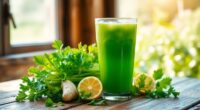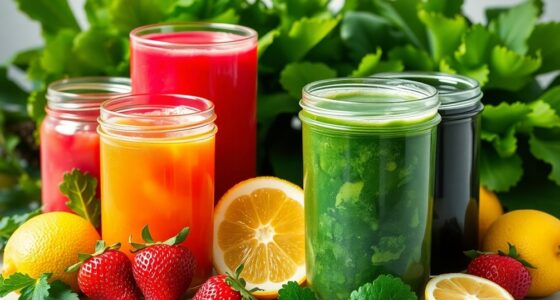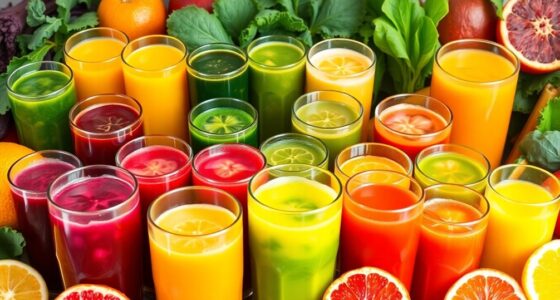Freshly juiced beverages typically last 24 hours, especially if you use a centrifugal juicer. If you opt for a masticating or cold press juicer, your juice might stay fresh for up to 2-5 days. Always refrigerate below 40°F in airtight glass containers to maximize freshness. Citrus juices, thanks to their acidity, tend to last longer. You'll want to keep an eye out for spoilage signs to ensure safety and quality. Discover more about juice longevity and safe handling practices.
Key Takeaways
- Freshly squeezed juices generally last up to 24 hours, while masticating juicers can extend freshness to 48 hours.
- Citrus juices like orange have a shelf life of 2-3 days, while pineapple and lemon juices last 4-5 days.
- Vegetable juices typically remain fresh for about 24 hours; proper refrigeration below 40°F slows bacterial growth.
- Using glass containers and sealing them airtight helps maintain juice quality and prolongs freshness.
- Signs of spoilage include color changes, unpleasant odors, and off flavors; monitor for these to ensure safety.
Understanding Fresh Juice Shelf Life
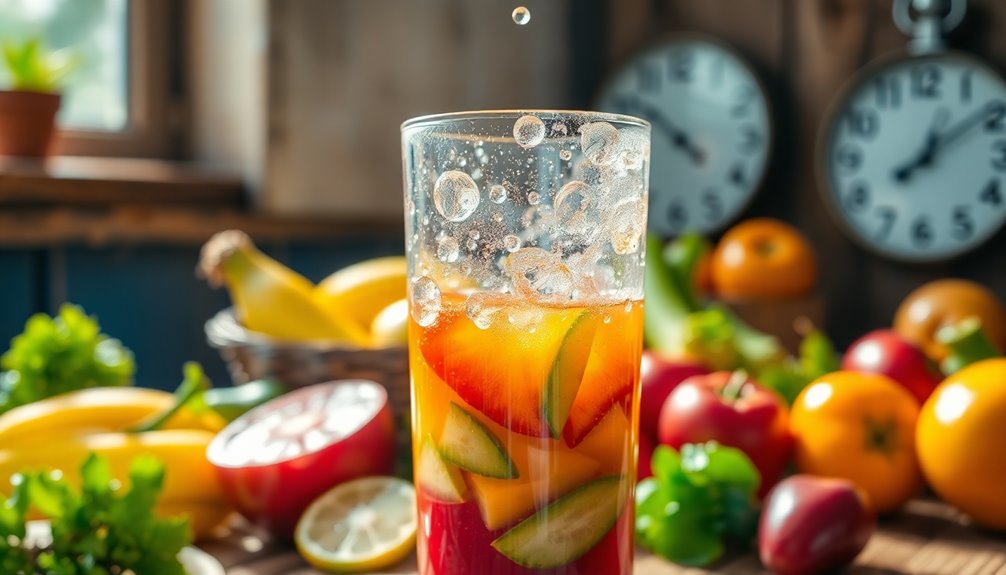
When you make fresh juice, understanding its shelf life is essential for enjoying its maximum flavor and nutritional benefits. Freshly squeezed juices typically last up to 24 hours when stored properly, though some can last longer. High pressure processing can extend juice shelf life significantly, allowing it to remain fresh for weeks instead of days.
If you use a masticating juicer, your juice could stay fresh for 48 hours. Proper storage in dark, airtight containers in the refrigerator is crucial. For example, freshly squeezed orange juice can last two to three days, while pineapple and lemon juices can last four to five days. In contrast, vegetable juices usually only last about 24 hours.
Factors Influencing Juice Longevity
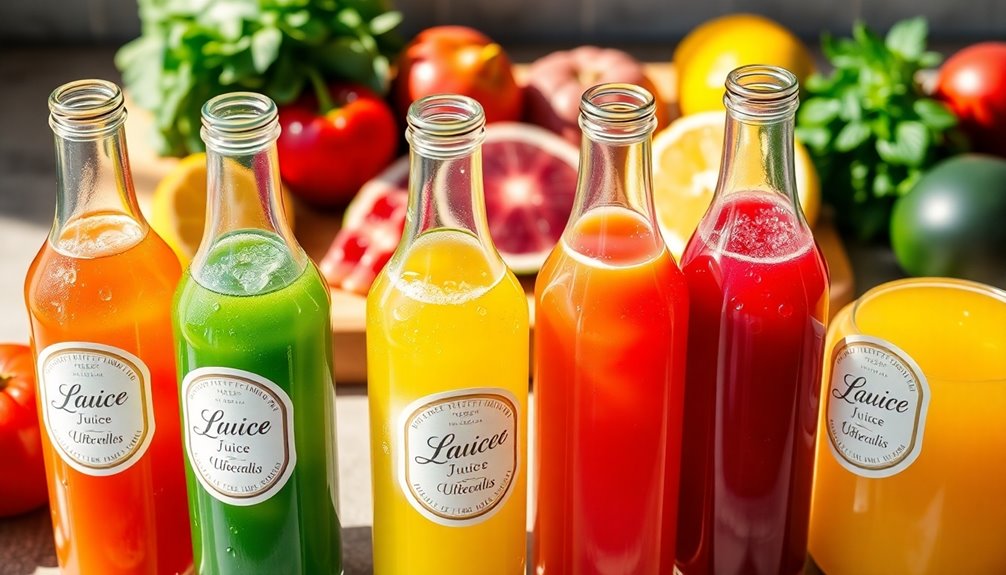
Several factors influence how long your fresh juice will last, and understanding these can help you enjoy it at its best. The freshness of the ingredients, the method of extraction, and the storage conditions all play significant roles in determining juice longevity. For instance, fresh green juice shelf life can vary, with properly stored juice typically lasting 24 to 72 hours in the refrigerator, while exposure to air and light can accelerate spoilage. Keeping your juice in airtight containers and away from direct sunlight can help maximize its freshness and nutrient content.
The type of juicer you use plays a significant role; centrifugal juicers shorten shelf life to about 24 hours, while masticating models can extend it to 2-3 days. Cold press juicers can keep juice fresh for up to 5 days. Masticating juicers produce juice that lasts longer due to slower oxidation, making them a better choice for longevity.
Proper storage conditions matter too—refrigeration below 40°F slows bacterial growth, and airtight containers minimize oxidation.
Environmental factors, like light and temperature, also impact freshness.
Lastly, juice composition is crucial; citrus juices and those with added lemon can last longer due to their natural acidity and antioxidants.
Choosing wisely maximizes your juice's longevity.
The Role of Acidity in Juice Preservation
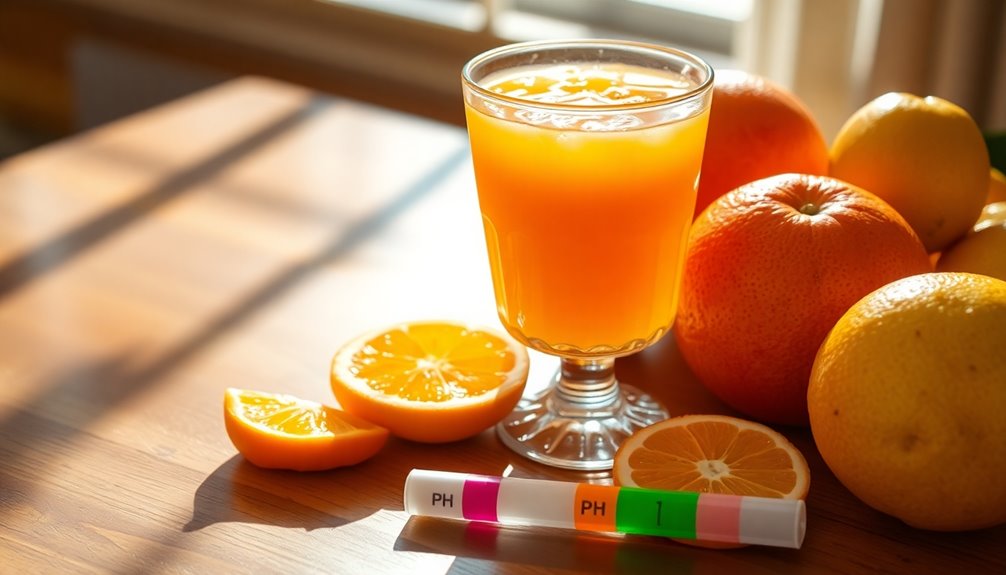
Understanding how acidity affects juice preservation can significantly impact how long your fresh juice remains enjoyable. Juices with higher acidity, like citrus or grape juice, last longer because they create an environment that inhibits microbial growth.
When the pH is below 4.5, spoilage organisms struggle to thrive, extending the juice's shelf life. Additionally, high acidity reduces enzyme activity, preventing browning and maintaining quality. Nutrients, particularly vitamin C, are also preserved, providing antioxidant benefits. Juice acidity is an important factor that influences preservation time, as higher acidity equals longer shelf life.
To further enhance the longevity of your juice, incorporating juices rich in vitamins A, C, and E can also contribute to overall health benefits while preserving freshness. You'll find that acidic juices can typically last 3-5 days in the fridge, while low-acid juices often only last about 2 days. By increasing acidity naturally, you can enhance preservation without compromising flavor or nutrients.
Storage Techniques for Optimal Freshness
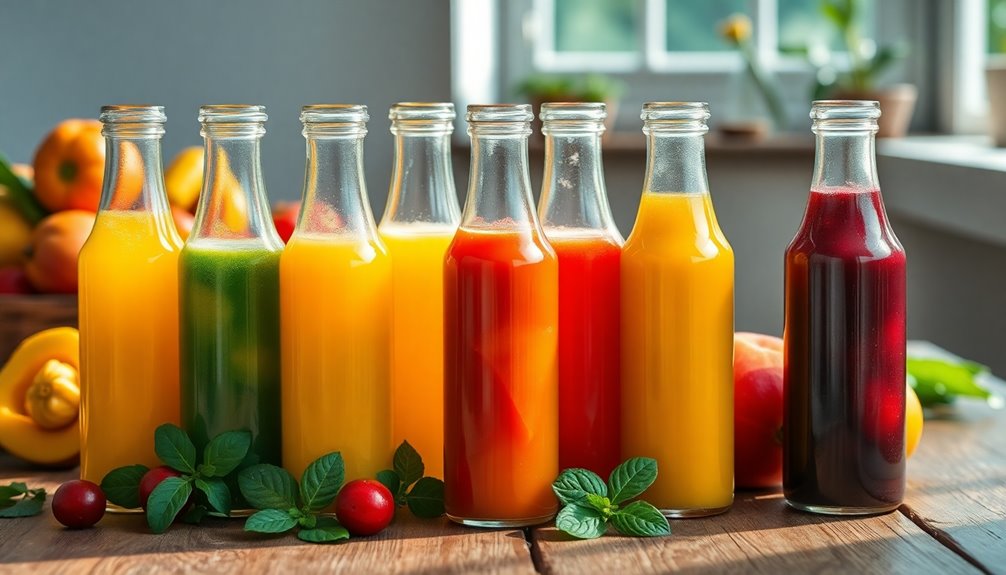
To keep your fresh juice at its best, proper storage techniques are essential. Use glass containers, as they prevent oxygen from degrading nutrients. Seal them airtight and fill them to the top to minimize oxygen exposure. Additionally, using airtight glass containers helps reduce acid breakdown in preserved juices. Fresh juices, especially those with high antioxidant levels, can benefit from these storage practices, enhancing their longevity and health benefits.
Store your juice immediately in the fridge, avoiding the door where temperatures fluctuate. For longer storage, freezing is your best bet—just remember to use freezer-safe containers and leave space for expansion. If you want to boost freshness, add citrus like lemon or lime. Thaw frozen juice in the refrigerator before consuming.
For travel, pack your juice in a cooler with ice packs. Prioritize drinking your juice soon after juicing for optimal nutritional benefits.
Comparison of Different Juice Types

Freshness Unleashed: How Long Does Fresh Juice Last After Juicing?
Comparison of Different Juice Types
Knowing how to store your fresh juice can help maintain its quality, but it's also important to consider the type of juice you're consuming.
Fresh orange juice typically lasts 2-3 days, while pineapple and lemon juice can last 4-5 days in the fridge. Raw juices can provide vibrant taste due to their intact nutritional profile. Additionally, the presence of fresh herbs can enhance the flavor and nutritional value of your juice.
Vegetable juices, however, usually last only about 24 hours. Fresh fruit juices generally stay good for 24-72 hours.
If you opt for high-pressure processed juices, you can enjoy them for up to 45 days due to the inactivation of microorganisms.
Remember, the type of juicer you use also impacts shelf life; masticating juicers produce longer-lasting juice than centrifugal ones.
Always store your juice in optimal conditions to maximize freshness!
Preservation Methods to Extend Shelf Life
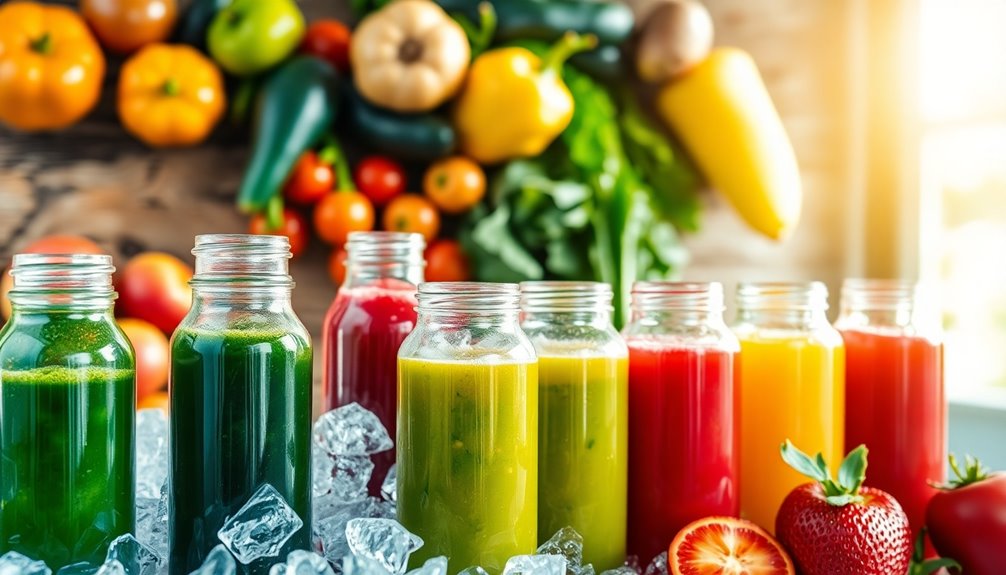
While you might enjoy fresh juice for its vibrant taste and nutrients, employing effective preservation methods can significantly extend its shelf life.
Refrigerate your juice in airtight glass containers to minimize oxidation, keeping it at 35-40°F (1.6-4.4°C). Adding a splash of lemon juice can help, too! Fresh juice lasts up to three days in the refrigerator, so be sure to consume it within this timeframe for optimal flavor. Fresh lemon juice typically lasts 2-3 days in the fridge, so using it as a preservative can be beneficial.
For longer storage, consider freezing your juice in small portions—this can keep it fresh for 2-3 months. If you want to take it a step further, pasteurizing your juice at home can also extend its life.
For those looking for long-term options, canning acidic juices or using aseptic packaging can lead to shelf lives of up to 6 months without refrigeration.
These methods ensure you can enjoy your juice longer!
Homemade vs. Commercial Juice Shelf Life

When you compare homemade and commercial juices, you'll find significant differences in shelf life that can influence your choice.
Homemade juice usually lasts between 24 to 72 hours in the fridge, depending on the juicer type and storage conditions. If you freeze it, you can extend its shelf life up to six months, but some nutrients and flavor may diminish. Twin-gear juicers can help homemade juice last even longer, up to 4 to 5 days, making them a great investment for those who juice frequently. Incorporating high-fiber ingredients like chia seeds into your diet can complement your juicing routine by promoting satiety and supporting weight loss.
On the other hand, commercial juices can last several months, thanks to pasteurization and advanced packaging techniques. While they offer more convenience, homemade juice often retains more nutrients and has a fresher taste.
Ultimately, it boils down to whether you prioritize freshness and nutrition or the longevity and convenience of commercial options.
Handling and Preparation Best Practices
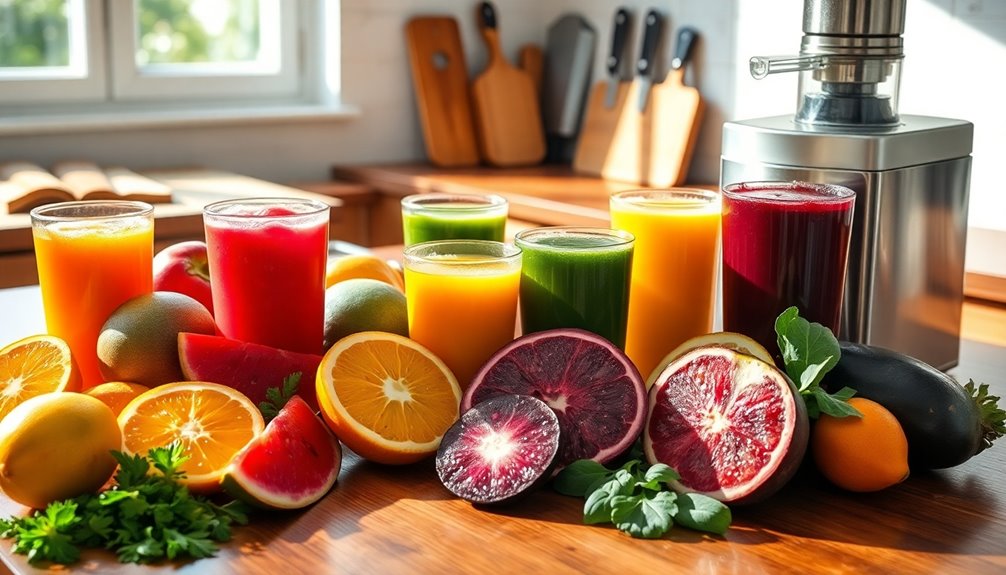
To ensure the highest quality and safety of fresh juice, it's essential to follow best practices for handling and preparation.
Start by selecting only wholesome fruits and vegetables, avoiding any dropped or defective produce. Clean and process your ingredients just like commercial packinghouses do, as this reduces natural microflora.
Maintain strict cleanliness protocols; minimize bare hand contact and ensure all produce is kept in a sanitary environment until extraction. Equipment should be clean and food-grade, with proper sanitation after each use. Properly prepared produce enhances juice preservation and safety.
Store juice in refrigerated conditions at 41°F (5°C) or below immediately after extraction.
Lastly, keeping your workspace cool, ideally around 39°F, helps maintain juice freshness and quality.
Signs of Spoilage in Fresh Juice
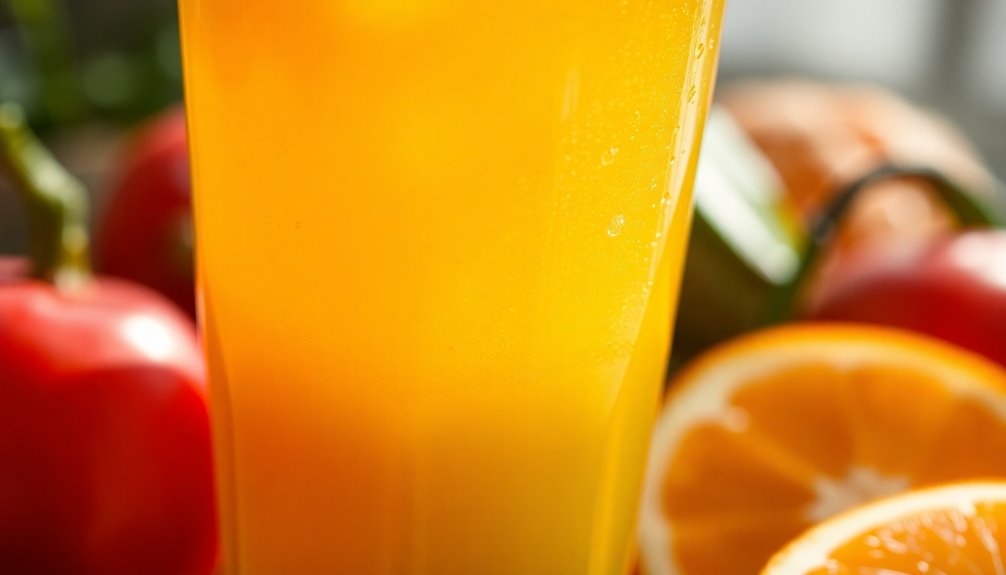
Even with careful handling and preparation, fresh juice can still spoil if not monitored closely.
Watch for color changes; if your green juice turns brown or appears murky, it’s likely spoiled. A chunky or slimy texture, especially if you see thickening or sludge at the bottom, also signals spoilage. Consuming fresh juice rich in antioxidants can help support overall health, but spoiled juice can have the opposite effect. To ensure your beverages maintain their quality, it’s essential to store them properly and consume them within a few days of making them. Additionally, using airtight containers can help prevent vape juice from browning and preserve the intended flavor. Always be mindful of expiration dates and signs of spoilage, as consuming degraded products can negatively impact your health.
Pay attention to smell—sour or unpleasant odors indicate fermentation. If it smells like beer or wine, toss it out. Proper juice storage is essential to prolong freshness and prevent spoilage.
Finally, taste matters; sharp, bitter, or off flavors mean the juice has gone bad.
Frequently Asked Questions
Can I Drink Juice After Its Expiration Date?
You shouldn't drink juice after its expiration date, as it may pose health risks.
While the expiration date indicates the end of guaranteed quality, it doesn't always mean the juice is safe to consume.
Look for signs of spoilage like off smells or fizz.
If you've stored it properly, you might extend its life a bit, but it's better to be safe than sorry and avoid expired juice altogether.
What Are the Best Fruits for Juice Longevity?
Imagine sipping a refreshing, vibrant juice that seems to last like summer's glow.
For longevity, you can't go wrong with citrus fruits like oranges and lemons—they're nature's little preservatives.
Apples are versatile too, staying fresh for months.
Don't forget grapes, bursting with antioxidants, and mangoes, bringing a tropical twist.
Pomegranates, with their complex flavors and health perks, also make an excellent choice.
Choose wisely, and your juice will shine longer!
Does Freezing Affect Juice Taste or Texture?
Freezing can affect juice taste and texture, but if you do it right, the changes are minimal.
Citrus juices usually freeze well, while high-water-content juices may become watery upon thawing. To keep the texture intact, strain out pulp before freezing and consider using ice cube trays.
Proper thawing in the fridge helps maintain quality. Remember, adding a squeeze of lemon can preserve flavor and nutrients during the freezing process!
How Can I Tell if Juice Has Gone Bad?
How can you tell if your juice has gone bad? First, check for an off smell or a change in color; these are clear indicators.
If it tastes sour or bitter, it's best to throw it out. Look for unusual cloudiness or sediment, which aren't typical for fresh juice.
Lastly, if it's fizzy, fermentation has likely set in, so don't risk it—discard it to avoid any unpleasant surprises!
Can I Mix Different Juices for Better Shelf Life?
Yes, you can mix different juices for better shelf life!
Combining juices with varying acidity levels can enhance preservation. More acidic juices often last longer, which means they can help protect less acidic ones.
Just remember to store your mixed juices in airtight containers and keep them refrigerated to minimize oxidation.
Using techniques like vacuum sealing can also help maintain freshness.
Regularly check for any signs of spoilage to ensure safety.
Conclusion
In the world of fresh juice, time is both your ally and your enemy. Just like a vibrant sunset, its brilliance fades if you don't savor it soon. By understanding factors like acidity and proper storage, you can keep that liquid sunshine bursting with flavor and nutrients. Whether you're sipping homemade or store-bought juice, remember: freshness is fleeting. So, grab that glass and enjoy every drop before it slips away like grains of sand through your fingers.
Cindy thoroughly researches juicing trends, techniques, and recipes to provide readers with practical advice and inspiration. Her writing style is accessible, engaging, and designed to make complex concepts easy to understand. Cindy’s dedication to promoting the advantages of juicing shines through her work, empowering readers to make positive changes in their lives through the simple act of juicing.


